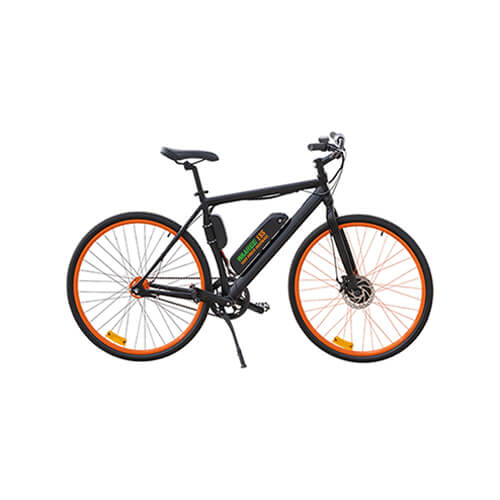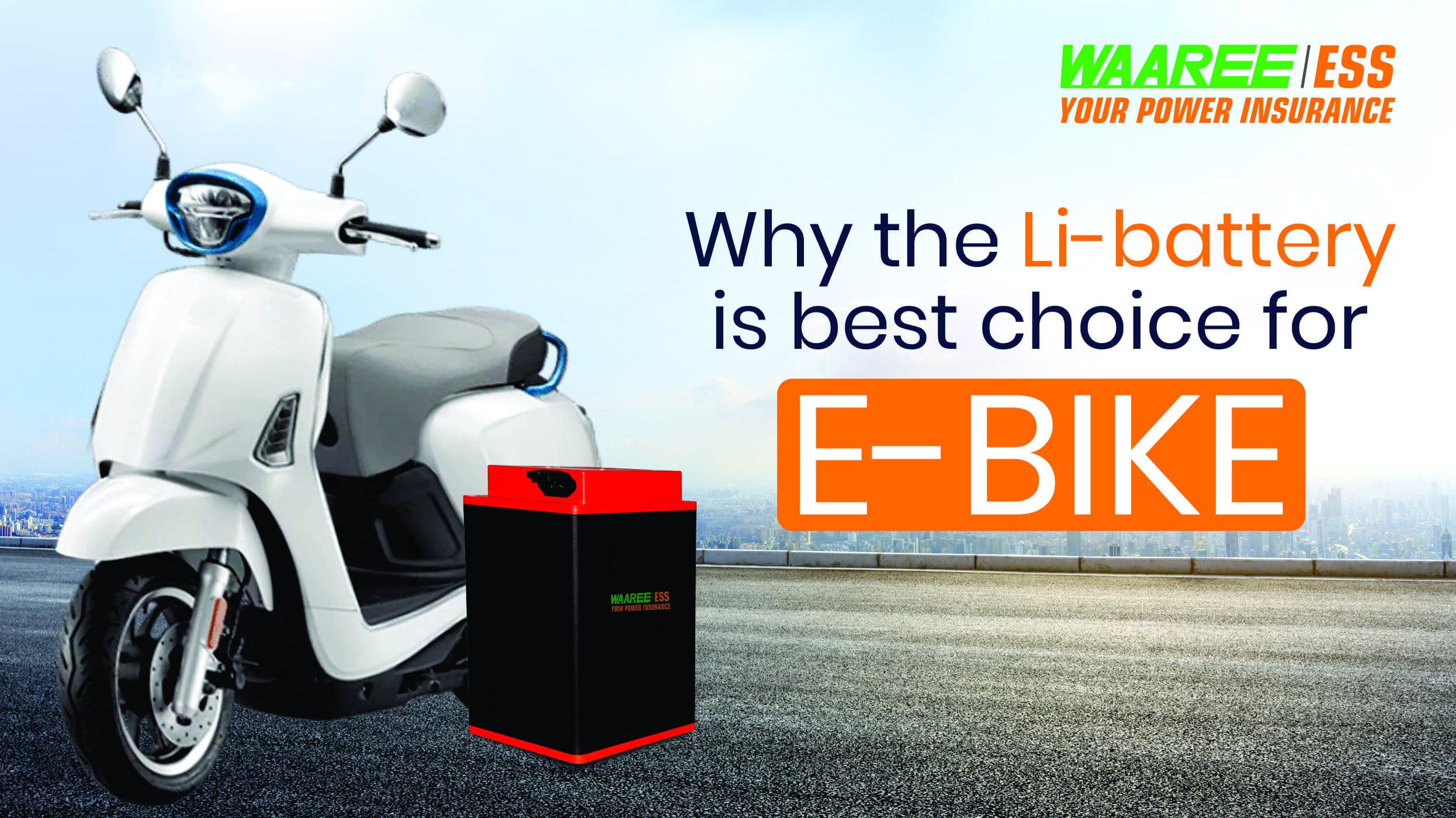A Li-battery, or lithium-ion battery, is a type of rechargeable battery that uses lithium ions as the main component in its electrochemical process. Li batteries are commonly used in portable electronic devices such as smartphones, laptops, and tablets, as well as electric vehicles and renewable energy storage systems. These batteries have a high energy density, a long lifespan, and a low self-discharge rate. However, they can be sensitive to overcharging and high temperatures and may require special handling and disposal due to their use of lithium, a flammable and potentially toxic material.

What are the Advantages of Lithium-ion Battery for Electric Bike
- High energy density: Li-ion batteries have a high energy density, meaning they can store a lot of energy in a small space. This makes them ideal for use in electric bikes where space is often limited.
- Lightweight: Li-ion batteries are much lighter than traditional lead-acid batteries, making them easier to handle and transport. This is especially important for electric bikes where weight is a major consideration.
- Long lifespan: Li-ion batteries have a longer lifespan than lead-acid batteries, meaning they will need to be replaced less often. This can save money in the long run and is more environmentally friendly.
- Low maintenance: Li-ion batteries do not require regular maintenance as lead-acid batteries do. They do not need to be filled with water or have their terminals cleaned.
- High efficiency: Li-ion batteries have a high-efficiency rate, meaning they will convert more of the energy they store into usable power. This results in longer ride times and more power for climbing hills.
- Widely available: Li-ion batteries are widely available and have a good supply chain, making them easy to find and purchase.
- Low self-discharge rate: Li-ion batteries have a low self-discharge rate, meaning they will retain their charge for longer periods of time when not in use. This makes them ideal for electric bikes that are not used regularly.
How Many Chemical Types of Batteries Apply to E-mobility Products?
There are several chemical types of batteries that apply to e-mobility products, including:
- Lithium-ion batteries – These are the most commonly used type of battery in e-mobility products, such as electric vehicles and electric bicycles. They offer high energy density and long life cycles.
- Lead-acid batteries – These batteries have been used in e-mobility products for a long time but are less popular than lithium-ion batteries due to their lower energy density and shorter life cycles.
- Nickel-cadmium batteries – These batteries are less commonly used in e-mobility products, but they offer good energy density and long life cycles.
- Sodium-ion batteries – These batteries are a newer technology and are not yet widely used in e-mobility products, but they offer high energy density and long life cycles.
- Lithium-sulfur batteries – These batteries are a newer technology and are not yet widely used in e-mobility products, but they offer high energy density and long life cycles.
- Lithium-polymer batteries – These batteries are a newer technology and are not yet widely used in e-mobility products, but they offer high energy density and long life cycles.
In summary, there are at least six chemical types of batteries that apply to e-mobility products, including lithium-ion, lead-acid, nickel-cadmium, sodium-ion, lithium-sulfur, and lithium-polymer batteries.
Read Further: Types of Energy Storage Systems
How do lead-acid and lithium-ion batteries compare?
|
Lead-acid batteries |
Lithium-ion batteries |
| Heavy and bulky | Lightweight and compact |
| Lower energy density | Higher energy density |
| Less efficient in charging and discharging | More efficient in charging and discharging |
| Less sensitive to temperature | More sensitive to temperature |
| Less expensive | More expensive |
| Lower cycle life | Higher cycle life |
| Less environmentally friendly | More environmentally friendly |
| Less safe in handling | More safe in handling |
For electric mobility, what is the best lithium battery to choose?
Determine the voltage and capacity requirements: The voltage and capacity of the battery will depend on the specific needs of your electric mobility device. For example, a scooter may require a battery with a lower voltage and capacity compared to an electric car.
Check the battery type: Lithium batteries come in various types such as lithium-ion, lithium-polymer and lithium-iron-phosphate. Each type has its own unique properties and characteristics, so it’s important to choose the right one for your application.
Consider the weight and size: Electric mobility devices have limited space, so it’s important to choose a battery that is lightweight and compact to fit into the available space.
Check the battery’s safety features: Safety is a crucial factor when choosing a lithium battery. Look for batteries that have built-in safety features such as overcharge, overdischarge and short-circuit protection.
Review the warranty and service: It’s important to choose a battery that comes with a good warranty and service support to ensure that you are protected in case of any issues.
Choose a reputable brand: It’s always a good idea to choose a reputable brand that has a proven track record of producing high-quality lithium batteries. This will give you peace of mind and ensure that you are getting a product that is reliable and long-lasting.
Read Further: Advantages and Disadvantages of Lithium-ion Battery
How long does a lithium e-bike battery last?
The battery life of a lithium e-bike battery can vary depending on several factors such as the brand, size, and usage. On average, a high-quality lithium e-bike battery can last between 500-1000 charge cycles or 2-5 years with proper care and maintenance. However, some Lithium ion Battery manufacturers may claim a longer battery life of up to 1000 charge cycles or more. It’s important to note that the battery’s capacity will decrease over time and its performance may not be as good as when it was new.
See Also: Lithium ion Battery vs Lithium Polymer Battery
Which countries prefer lithium batteries when charging e-bikes?
United States: Lithium-ion batteries are widely used in consumer electronics such as smartphones, laptops, and tablets. They are also used in electric vehicles, renewable energy storage systems, and backup power systems.
China: China is the largest producer and consumer of lithium-ion batteries in the world. They are used in a wide range of applications, including electric vehicles, consumer electronics, and energy storage systems.
Japan: Japan is a major producer of lithium-ion batteries and is known for its advanced technology in this field. They are used in electric vehicles, consumer electronics, and energy storage systems.
South Korea: South Korea is another major producer of lithium-ion batteries and is known for its advanced technology in this field. They are used in electric vehicles, consumer electronics, and energy storage systems.
Germany: Germany is a major producer of lithium-ion batteries and is known for its advanced technology in this field. They are used in electric vehicles, consumer electronics, and energy storage systems.
France: France is a major producer of lithium-ion batteries and is known for its advanced technology in this field. They are used in electric vehicles, consumer electronics, and energy storage systems.
Italy: Italy is a major producer of lithium-ion batteries and is known for its advanced technology in this field. They are used in electric vehicles, consumer electronics, and energy storage systems.
United Kingdom: The United Kingdom is a major producer of lithium-ion batteries and is known for its advanced technology in this field. They are used in electric vehicles, consumer electronics, and energy storage systems.
In conclusion, using lithium-ion batteries for e-bikes has proven to be a reliable and efficient solution. These batteries have a long lifespan, are lightweight, and have a high energy density, making them ideal for use in e-bikes. They also have a low self-discharge rate, which means they can hold their charge for a longer period of time. Additionally, lithium-ion batteries are eco-friendly and do not contain any toxic materials. Overall, using lithium-ion batteries for e-bikes is a smart choice for those who want a dependable, energy-efficient, and environmentally-friendly mode of transportation.



Leave A Comment
You must be logged in to post a comment.